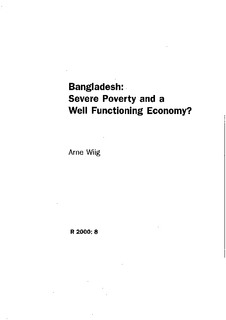| dc.description.abstract | This is the first report on Bangladesh under the Country Advisor Agreement between the Norwegian Agency for Development Co-operation (NORAD), the Chr. Michelsen Institute (CMI) and the Nordic Consulting Group (NCG). The report consists of two parts. Part 1 comprises an assessment and overview of the prevailing macro-economic situation in Bangladesh. With this background, the second part focuses on the way in which the Government, through their expenditures on the social sectors, is targeting the poor. The analytical approach is based on a decomposition method where public expenditure is divided between sectors and subsectors.
It is found that the public expenditure ratio in Bangladesh is low compared to other developing countries. At the same time, the social allocation ratio is high but the ultimate human development impact, as reflected in human development indicators, is low. This indicates that the social priority ratio must be increased. It is therefore argued that efforts must be made to improve the quality of public services, especially for primary education.
In addition to the two main parts, a database on social and economic indicators has been created. | |
